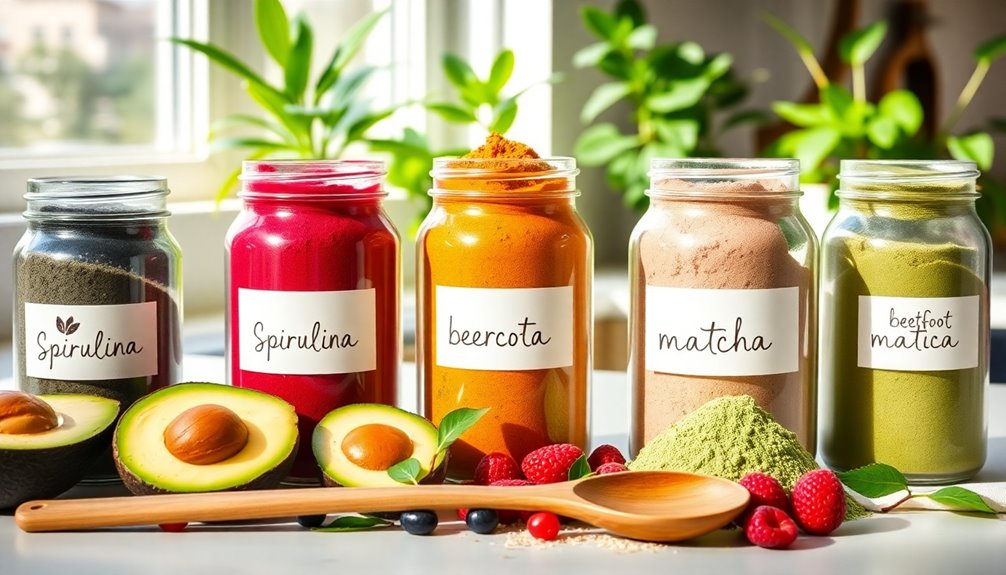If you're combining coffee with intermittent fasting, stick to black coffee to keep calories low and reap its appetite-suppressing benefits. Aim for 2-3 cups during your fasting periods to boost fat oxidation without disrupting your fast. Remember, adding sugar or cream will break your fast. Keep an eye on your caffeine intake, as sensitivity varies among individuals—stay within 400 mg a day to avoid jitters or digestive issues. Hydration is essential, so balance your coffee consumption with plenty of water. Explore more about optimizing your coffee habits and overall fasting experience!
Key Takeaways
- Black coffee is low in calories and recommended during intermittent fasting, promoting appetite suppression and fat oxidation.
- Moderate coffee intake (2-3 cups daily) can enhance insulin sensitivity and reduce inflammation, supporting fasting benefits.
- Stay hydrated by balancing coffee consumption with water to prevent dehydration, as caffeine has mild diuretic effects.
- Individual responses to caffeine vary; monitor for side effects like jitteriness and adjust intake accordingly.
- The 16/8 intermittent fasting method allows coffee consumption during fasting hours without disrupting metabolic benefits.
Intermittent Fasting Basics
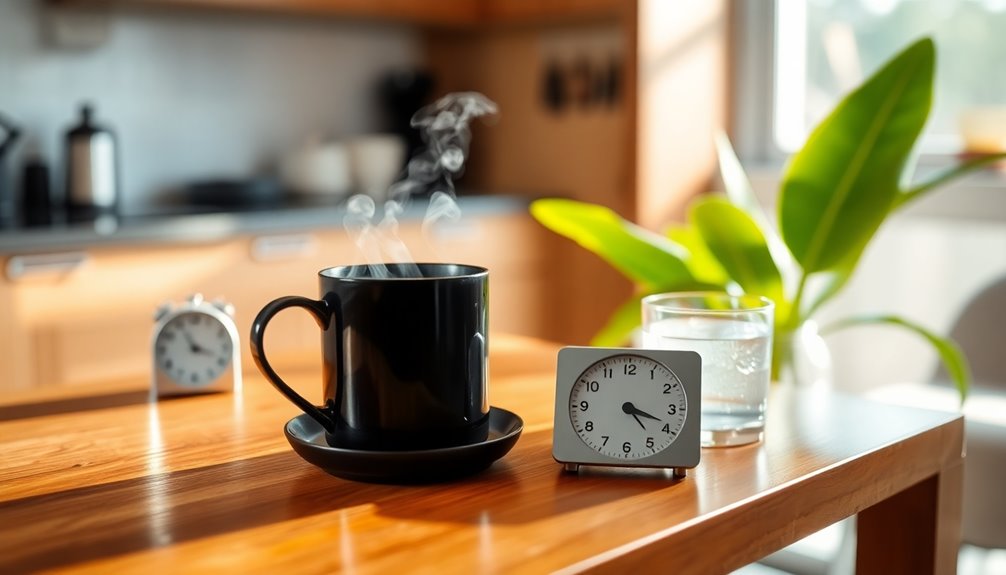
Intermittent fasting (IF) is a flexible eating pattern that alternates between periods of eating and fasting, making it easier to manage your meals.
One popular method is the 16/8 approach, where you fast for 16 hours and eat during an 8-hour window. During fasting periods, you're not allowed to consume food, but low-calorie beverages like water and black coffee can help curb hunger.
IF promotes weight loss by encouraging a caloric deficit, as you're eating less frequently. The health benefits of fasting extend beyond weight loss, potentially improving insulin sensitivity, reducing inflammation, and enhancing brain health. According to studies, drinking black coffee during fasting can help boost metabolism and suppress appetite.
However, remember that individual responses to intermittent fasting can vary, and it mightn't suit everyone, especially those with specific health conditions.
Acceptable Coffee Practices

When you're practicing intermittent fasting, incorporating black coffee into your routine can be beneficial. With only about 3-5 calories per cup, black coffee won't disrupt your fasting state.
Stick to moderate coffee consumption of 2-3 cups daily to enhance fat oxidation and help suppress your appetite during fasting periods. Avoid adding sugar, milk, or cream, as these can introduce calories that break your fast.
Specialty drinks like lattes and frappuccinos are best left out due to their high calorie and sugar content, which negates fasting benefits.
Additionally, black coffee can support metabolic changes that enhance fat burning during your fasting windows. Remember to stay hydrated with water alongside your coffee to counteract its diuretic effects and prevent dehydration during intermittent fasting. Enjoy your black coffee wisely!
Health Benefits of Coffee

Coffee offers a wealth of health benefits, especially when consumed during fasting periods. One of the most notable health benefits of coffee is its ability to improve brain function and enhance mental clarity, thanks to its caffeine content.
Drinking up to three cups a day can lower heart disease mortality risk by 19% and boost insulin sensitivity. Additionally, coffee's antioxidants help reduce inflammation, complementing the advantages of intermittent fasting.
It also aids appetite control, helping you feel full and stick to your fasting regimen. Furthermore, moderate coffee intake can enhance your metabolic rate and promote fat oxidation, making it a valuable addition to your fasting routine without disrupting metabolic processes. Consuming coffee can also lead to improved caffeine content in your beverage, further amplifying its benefits.
Enjoy your coffee and reap the rewards!
Types of Coffee to Avoid
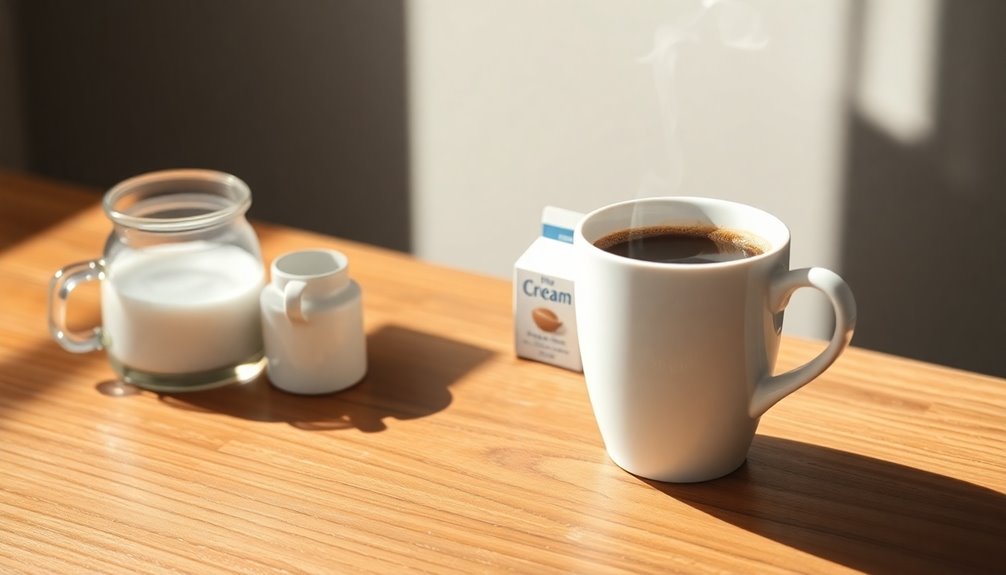
Steering your coffee choices during intermittent fasting is essential for maximizing its benefits.
There are specific types of coffee to avoid if you want to maintain your fast. Lattes and cappuccinos, packed with added ingredients like milk, are high in calories and not suitable. Specialty drinks such as mochas and frappes contain sugars and creams that can easily break your fast.
Even Bulletproof coffee, which includes added fats, is high in calories and disrupts the fasting process. Any coffee with sugar, syrup, or cream should be off your list.
Instead, opt for black coffee, which has only 3-5 calories per cup, ensuring your calorie intake stays minimal and your fasting benefits remain intact.
Caffeine Intake Considerations
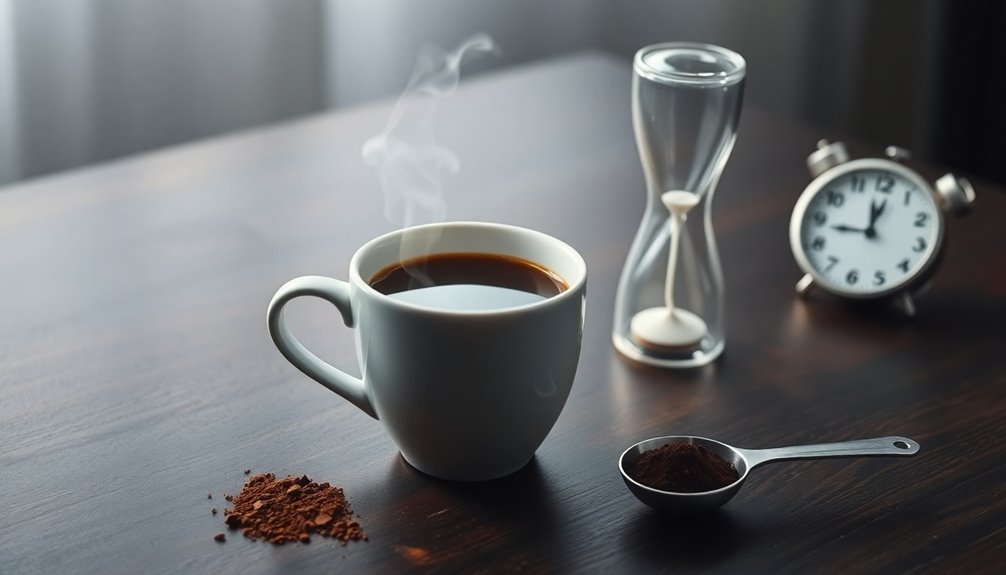
Steering your caffeine consumption during intermittent fasting is important for maintaining both your energy levels and overall health. Here are three key considerations for managing your caffeine intake:
- Moderate amounts of black coffee: Stick to about 400 mg of caffeine daily, or roughly four cups of black coffee, to enjoy its benefits without adverse side effects.
- Monitor side effects: Be aware of jitteriness, increased fasting insulin levels, and digestive issues. Excessive caffeine can lead to dehydration and disrupt your fasting routine.
- Adjust for individual responses to caffeine: Everyone reacts differently. Pay attention to how your body responds and adjust your coffee intake as needed to prevent dependency or withdrawal symptoms. Additionally, incorporating low-acid coffee varieties may help reduce gastrointestinal discomfort during your fasting periods.
Individual Responses to Coffee

When it comes to coffee during intermittent fasting, your individual response can vary widely.
You might find that your caffeine sensitivity, personal preferences, and tolerance levels greatly impact how coffee affects your energy and cravings.
It’s important to pay attention to how your body reacts so you can tailor your coffee intake for the best results. Even though some people may experience jitters or increased heart rate from too much caffeine, others may find that a moderate amount of coffee gives them a much-needed energy boost. Understanding the benefits of coffee consumption, such as improved focus and mental alertness, can help you determine the right amount for your body. Additionally, being mindful of your coffee intake can help you avoid the negative side effects of excessive caffeine, such as insomnia or digestive issues.
Caffeine Sensitivity Variability
Caffeine sensitivity varies widely among individuals, making your experience with coffee during intermittent fasting uniquely your own. Your individual responses can hinge on factors like genetics and tolerance.
Here are three key points to reflect on:
- Metabolism Differences: Some people metabolize caffeine quickly, feeling energized, while others may feel jittery or anxious, even with small amounts.
- Age and Health Impact: As you age or experience hormonal changes, your caffeine sensitivity may shift, altering how you react to coffee consumption.
- Monitoring Responses: Keeping track of your personal responses to coffee can help you tailor your intake, optimizing energy levels and minimizing negative effects like sleep disturbances.
Understanding your caffeine sensitivity is essential for a successful intermittent fasting experience.
Personal Preference Importance
While many people find coffee beneficial during intermittent fasting, your personal preferences and responses to it play an important role in your fasting experience.
Individual responses to caffeine can vary considerably; you might feel energized and focused, or you may become jittery and anxious. It's vital to monitor how coffee affects you and adjust your intake based on your body's reactions.
Some may discover that coffee helps suppress appetite and reduces cravings, making fasting easier. Additionally, caffeine content in energy drinks can vary widely compared to coffee, making it crucial to choose your beverage wisely during fasting periods.
Tolerance and Dependency Effects
Understanding your tolerance and dependency on coffee is essential for maneuvering intermittent fasting effectively. Your individual response to caffeine can greatly influence your fasting experience.
Here are three key points to take into account:
- Tolerance Levels: Some people feel jittery with small doses, while others need more for the same effect.
- Dependency Risks: Regular consumption can lead to increased caffeine dependency, meaning you might need larger amounts over time.
- Withdrawal Symptoms: Reducing intake can trigger headaches, fatigue, and irritability within 12-24 hours.
Tips for Optimal Consumption

When you're practicing intermittent fasting, sticking to black coffee can be a game changer. It contains only 3-5 calories per cup, preserving the benefits of intermittent fasting while boosting your metabolism and fat oxidation.
To optimize your experience, limit your coffee intake to 2-3 cups daily. This helps you avoid jitteriness and sleep disturbances caused by excessive caffeine. Remember to drink coffee in moderation, as this enhances its positive effects without disrupting fasting.
It's also essential to stay hydrated, so pair your coffee during intermittent fasting with water to counteract its diuretic effects.
Finally, monitor your individual responses to caffeine, adjusting your consumption and timing to maintain your overall health and well-being.
Hydration and Coffee

Staying hydrated is essential during intermittent fasting, especially when you enjoy coffee.
While its diuretic effect can lead to increased urine output, balancing your coffee intake with plenty of water helps maintain hydration levels.
Importance of Water Intake
Hydration plays an essential role during intermittent fasting, especially as you indulge in your morning cup of coffee.
To guarantee ideal hydration while enjoying black coffee, keep these points in mind:
- Counter dehydration: Balance your black coffee intake with plenty of water to prevent dehydration.
- Suppress appetite: Adequate water intake can help curb hunger, making fasting more manageable.
- Support overall health: Staying hydrated enhances the benefits of intermittent fasting and supports bodily functions.
Coffee's Diuretic Effect
While you focus on keeping your body hydrated during intermittent fasting, the diuretic effect of coffee warrants attention.
Coffee's caffeine content, about 100 mg per 240 ml cup, contributes to its diuretic properties, which can increase urine output. This might lead to dehydration if you don't balance your water intake.
However, moderate coffee consumption generally doesn't cause significant dehydration in healthy individuals. If you regularly drink coffee, you might develop a tolerance to its diuretic effect, reducing the risk of dehydration.
Still, everyone's response varies, so it's crucial to monitor your hydration levels. To stay properly hydrated, make sure to drink plenty of water alongside your coffee during your fasting periods.
Balancing Hydration Levels
To maintain ideal hydration levels during intermittent fasting, you need to be mindful of how coffee affects your body. While you can enjoy your cup of joe, it's essential to balance it with water to avoid dehydration.
Here are some tips:
- Drink water: Aim to consume at least an equal amount of water to the coffee you drink.
- Monitor caffeine intake: Limit your caffeine per day to avoid excessive diuretic effects.
- Listen to your body: Adjust your coffee intake based on how you feel, prioritizing hydration.
Staying hydrated is imperative during fasting; dehydration can lead to fatigue and headaches.
Managing Hunger During Fasting
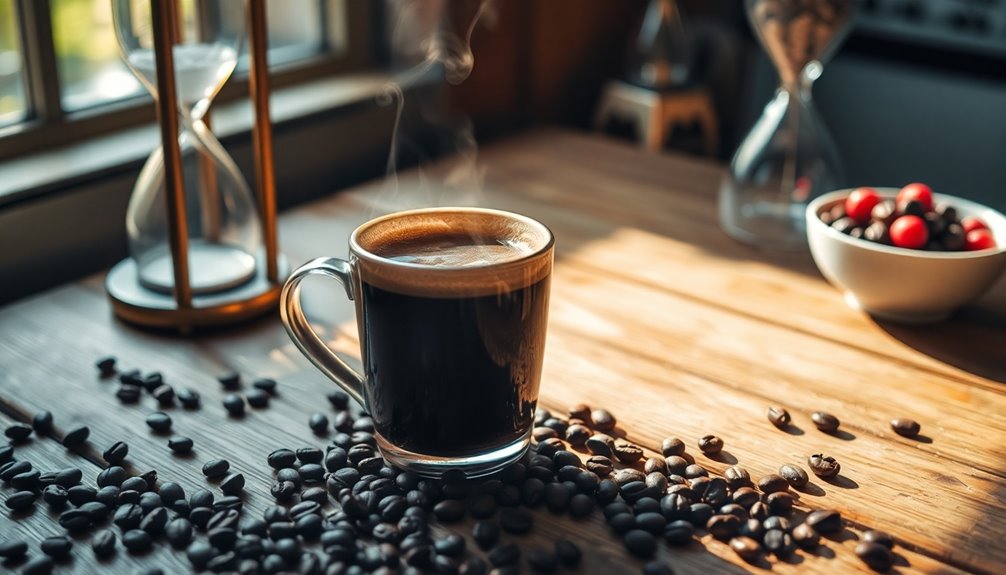
Managing hunger during fasting can be a challenge, but it's important to remember that your body can adapt over time.
As you embrace intermittent fasting, you might find that your hunger levels stabilize, allowing you to better manage hunger. Caffeine in coffee can provide effective appetite suppression, making it a valuable tool during your fasting periods.
Drinking black coffee—low in calories—can create a sense of fullness, helping you feel more satisfied. Additionally, as your body shifts to burning fat for energy, you may notice less frequent feelings of hunger.
Psychological factors can also play a role; many report reduced cravings as they become accustomed to fasting. Regular hydration, including drinking water alongside broad-spectrum sunscreen during your outdoor activities, can further assist in managing hunger and maintaining overall wellness.
With these strategies, you can tackle hunger effectively as you continue your journey.
Frequently Asked Questions
What Can I Put in My Coffee That Won't Break a Fast?
If you're looking to add something to your coffee without breaking your fast, stick to options that keep the calorie count low.
You can use a splash of heavy cream or a teaspoon of coconut oil, but keep it under 50 calories. Black coffee is a great choice since it's nearly calorie-free.
For flavor, a drop of natural extract, like vanilla or almond, works well.
Just remember to stay hydrated with water too!
Why Is 16 Hours the Magic Number for Fasting?
The 16-hour fasting window is considered effective because it allows your body to deplete glucose stores and shift to fat burning.
During this period, insulin levels drop, which enhances fat oxidation and improves metabolic health. It also promotes autophagy, aiding cellular repair and longevity.
This timeframe fits well into daily routines, making it manageable for most people. Plus, it aligns with your natural circadian rhythm, supporting better sleep and hormone regulation.
Can I Eat Whatever I Want While Intermittent Fasting and Still Lose Weight?
You can't just eat whatever you want while intermittent fasting and still expect to lose weight.
Even with the flexible meal timing, you need to maintain a caloric deficit. If you fill your eating window with high-calorie, processed foods, you risk negating your fasting efforts.
Focus on nutrient-dense options like fruits, vegetables, and lean proteins to support your weight loss goals while enjoying the benefits of intermittent fasting.
Consistency is key!
Does Creamer in Coffee Break a Fast?
Yes, adding creamer to your coffee can break a fast.
Creamers, whether dairy or non-dairy, introduce calories that can spike insulin levels, disrupting your fasting state.
Even a small amount of creamer can add significant calories, which may hinder the benefits of fasting.
If you want to maintain those benefits, it's best to stick with black coffee or use minimal caloric additions.
This way, you'll support your fasting goals more effectively.
Conclusion
In the grand tapestry of health, coffee can be a vibrant thread woven into your intermittent fasting journey. By understanding what practices work best, you can enjoy your favorite brew while reaping its benefits. Embrace the art of moderation and listen to your body's signals. After all, the right cup of coffee can be your ally, turning those fasting hours into a delightful experience. So, why not savor your coffee and elevate your fasting game?

